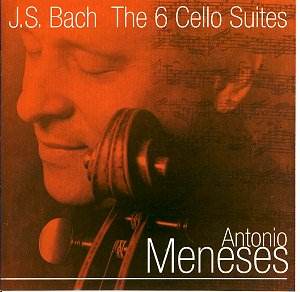Magazines or websites
which review CDs are, I suspect, most
commonly read by would-be purchasers
interested in acquiring the ‘best’ recording
of a piece, or the one which represents
‘best’ value for money. But - sorry,
my question is a cliché! - what
constitutes ‘best’? And who is best
qualified to say so? Why take my
recommendation of a ‘best’ recording
of the Bach Cello Suites, against the
obviously more trustworthy word of Starker,
Fournier, Tortelier, Schiff, Harrell,
Kirshbaum, Gendron, Wispelwey or Ma?
Which of these (including me!) has thought
longest and hardest about this music?
I ask this question
because, with this impressive new issue,
we’re presented with yet another high-ranking
recording of this timeless repertory,
and comparisons with others are once
more the order of the day. But comparisons,
even evaluative comparisons, don’t have
to result in some sort of batting order;
that would be an irksome and ultimately
pointless task, given the range of conflicting
criteria we necessarily adopt in order
to ‘assess’ different versions. Better
accept that players and reviewers too
have different yardsticks, and often
come to different but equally defensible
conclusions. Especially in repertory
such as this, ‘truth’ (whatever that
is) is far from absolute.
We can’t even satisfactorily
pigeon-hole players according to ‘school’
- say, old-school with modern instrument
on the one hand; ‘authentic’ (how I
hate that word!) with period instrument
on the other. For example, both Casals
and Bylsma, poles apart in terms of
their playing styles, each adopts a
free approach to tempi, dynamics, tone
and phrasing: and each exhibits a deeply
personal expressive rubato. On the other
hand, Rostropovich (an old-timer?) and
Jaap Ter Linden (a baroque specialist?)
tend to be more objective, more universal,
without obvious expressive indulgence,
clearly wanting their playing to be
a statement on behalf of the composer
rather than themselves. Okay, these
are oversimplifications: and I’m sure
that both Casals and Bylsma share the
same ultimate goal of illuminating Bach
- and only Bach!
Of course anyone keen
to duplicate key pieces such as the
Bach Cello Suites in their CD collection
will usually want contrasting performances:
performances which, in one way or another,
represent different stylistic approaches
- as with a subject being photographed
from opposite angles, or in different
lights. But a collector who is content
with a single CD is more likely to be
looking for a safe, middle-of-the-road
and hopefully ‘definitive’ performance,
rather than anything obviously wayward
or untypical.
All this is a prelude
to considering Meneses, who occupies
the middle ground between interpretative
extremities. I need to be careful here:
adjectives used to describe such performances
often imply blandness or monotony -
as with a landscape which, however beautiful,
lacks easily-distinguishable features.
In truth, these readings are anything
but bland or monotonous - Meneses speaks
with the voice of reason, wisdom and
maturity: he won’t provoke you, nor
will he disturb you!
First things first.
Meneses, his 1840 Jean-Baptiste Vuillaumme
cello, the East Woodhay recording location
and Simon Fox-Gál (the Avie producer,
engineer and editor) combine to produce
a truly beautiful and completely believable
sound. I feel as though, on my dozen
traversals of this set over these past
few days, Meneses has been playing specially
for me: as though I am his private audience.
True, you can hear his every sniff (not
too many of these, though, so don’t
worry) but you can also hear the subtlest
musical detail. The lower strings resonate
with a wonderful depth and weight: high
fidelity indeed!
Seemingly never wanting
to be either sidetracked or overly subjective,
his tempi tend to be brisk. But a great
performer can always shape music without
having to create room in order to do
so: here, phrases breathe and unfold
with a truly vocal conviction. And,
in those pieces which encourage expressive
extravagance, Meneses resists temptation:
and, in so doing, knowing the difference
between understatement and overstatement
only too well, he simply underlines
the point he is trying to make. So,
the opening Prelude of the G major may
lack the organ-like sustained ‘chords’
implied by its multi-string voicing:
but, with more detached bowing than
is customary, he allows it to speak
to us intimately, to be monodic rather
than polyphonic, implied rather than
overt. And the great D minor Sarabande
is sung with magisterial restraint:
no Mahlerian self-indulgence or youthful
excesses here! And yet Bach’s Bourrées
and Gigues have all the dance-like energy,
character and dashing momentum one could
possibly want.
His playing is impressively
accurate. Something we can surely take
for granted, you’re probably saying
to yourself. Not so! Such are the technical
demands of this music, it’s not uncommon
to find minor imperfections in intonation,
or phrase highpoints where tonal purity
is temporarily lost through some momentary
excess. Not here! Only in the high-lying
tessitura of the D major Suite written
for a five-string instrument, but played
here - as usual, even these days - on
a standard four-string instrument does
Meneses ever make you think he’s getting
near the edge.
Like a peace-maker
between rival factions, Meneses plays
as if inspired, as if motivated by something
bigger than all of us. He brings together
a lifetime’s experience of playing and
reflecting on this sublime music, and
incorporating all the richness and expressive
freedom of the ‘old school’ with the
more cerebral, intellectually-illuminated
thinking of today’s so-called ‘specialists’.
These are enduring performances, which
you can live with comfortably. A truly
wonderful thing, it deserves the strongest
recommendation: buy it, be it your 1st
recording, or your nth.
Peter J Lawson


